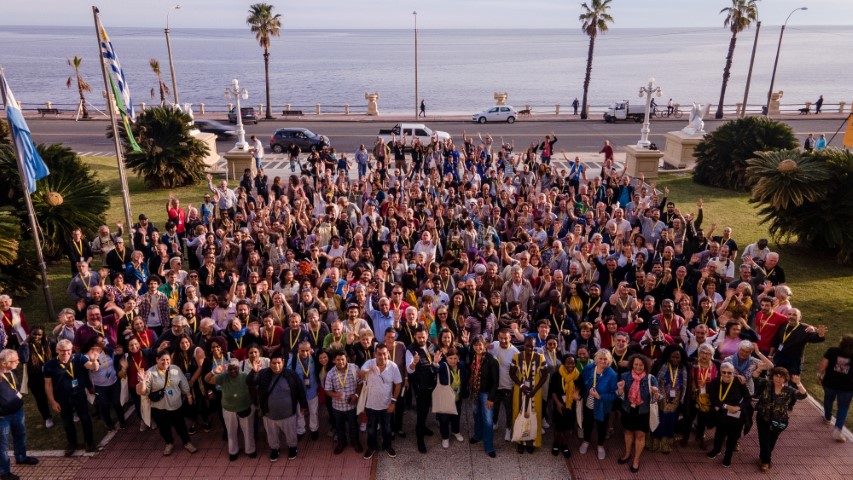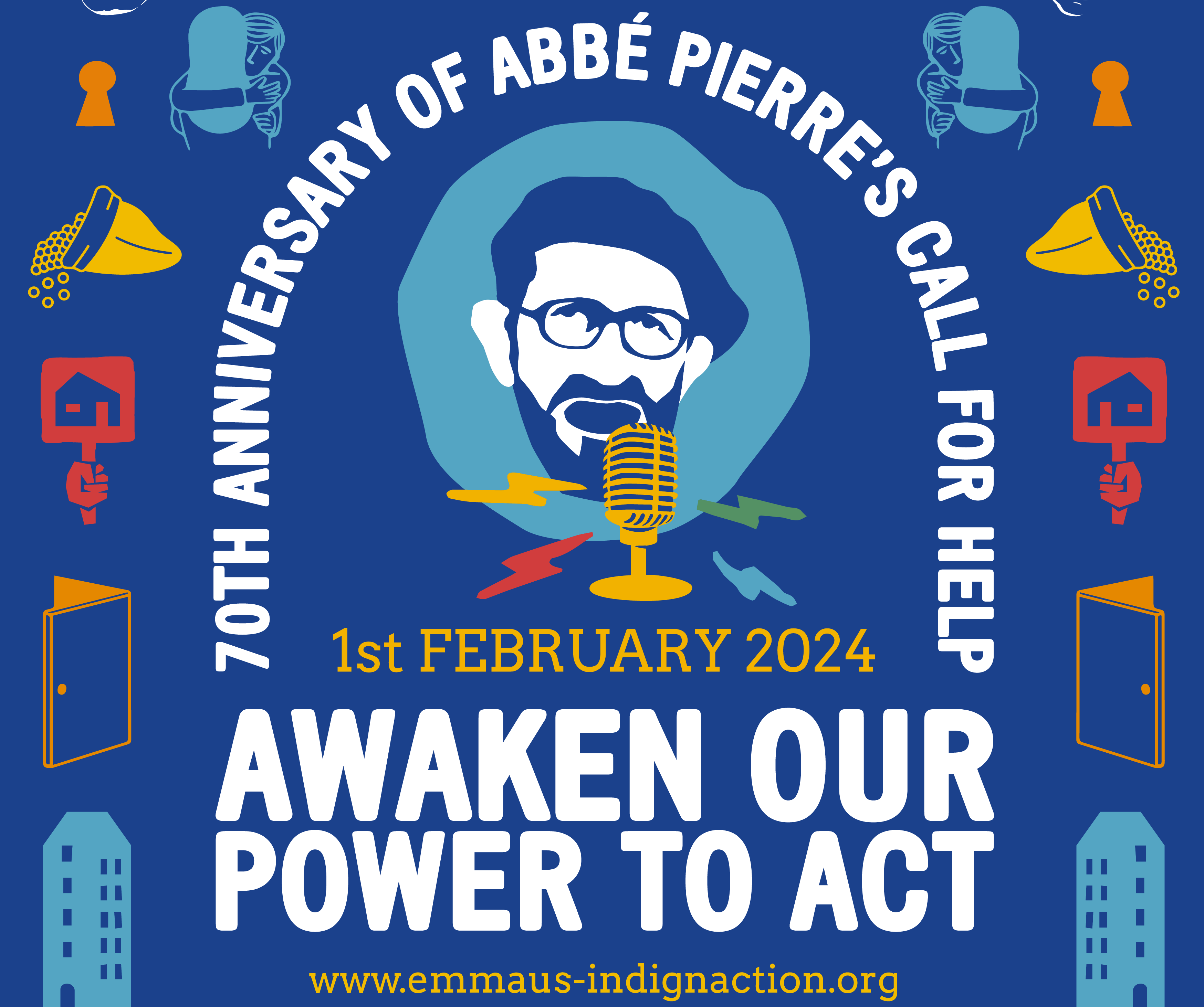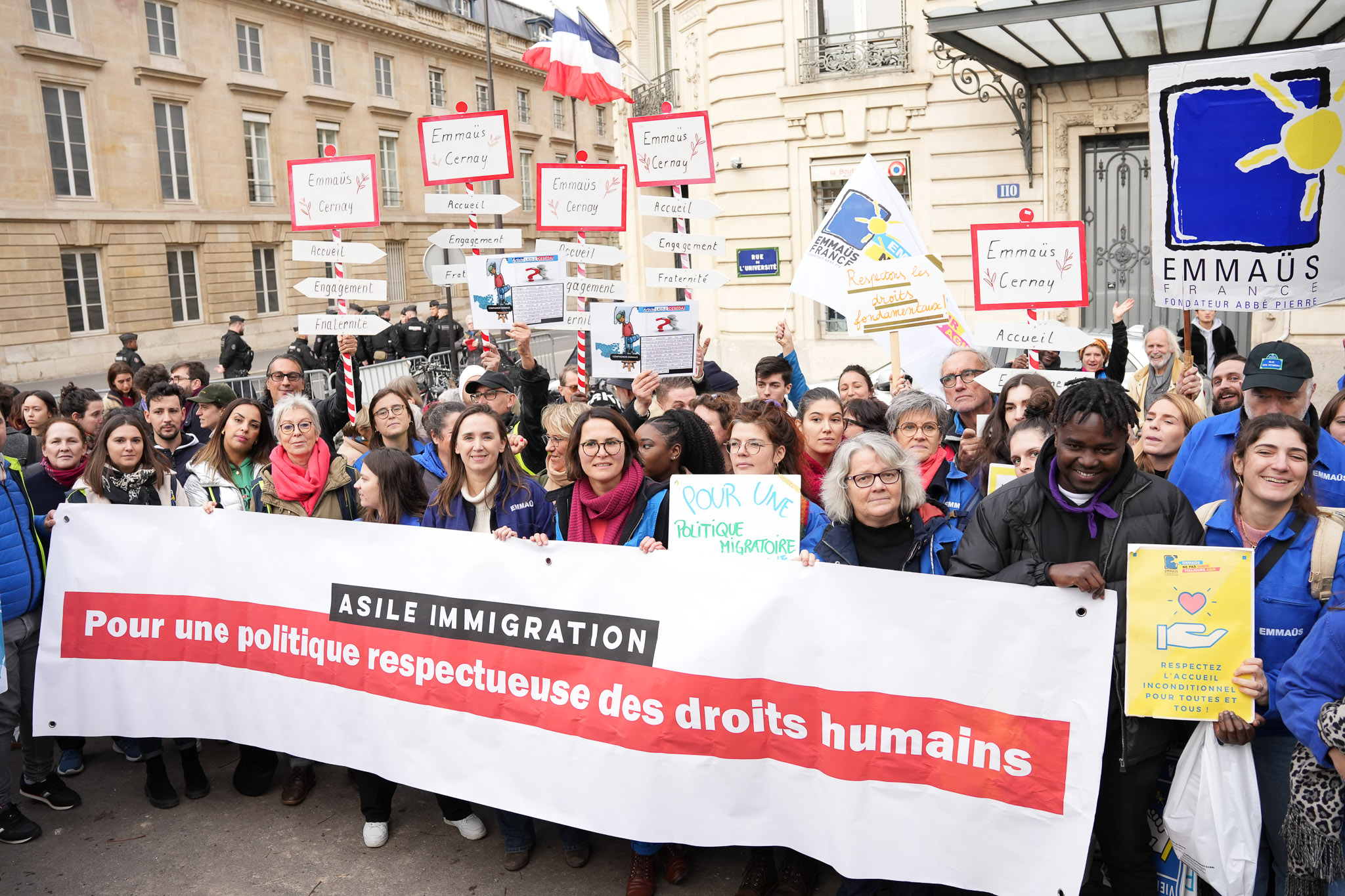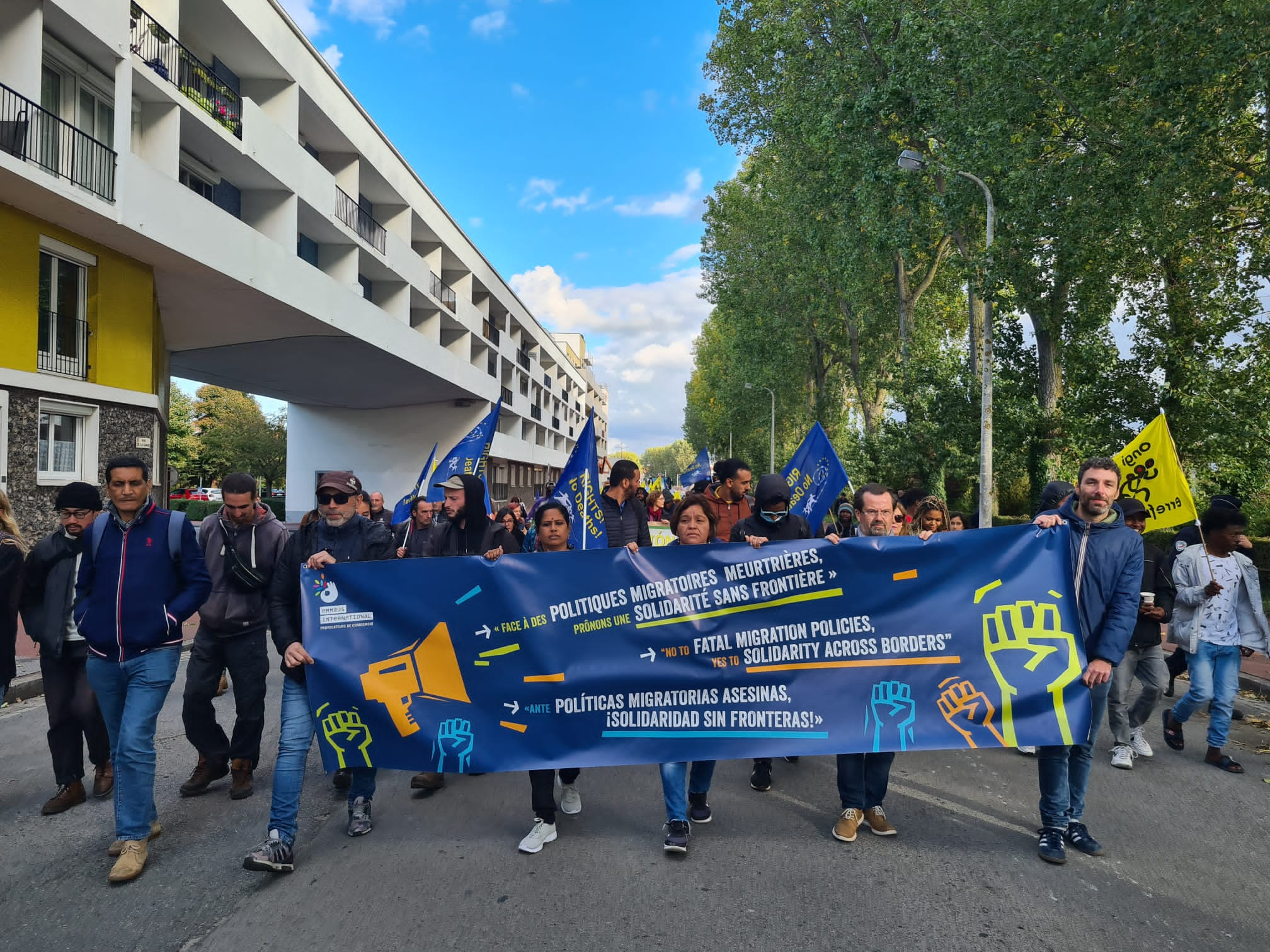World Assembly 2022: Changing the world with our struggles!

340 representatives of Emmaus groups from 34 countries and four continents are participating in this highly significant moment in the democratic life of the movement. They will take part in five days of debate and workshops, discussing and deciding on the new guidelines for Emmaus International to run until 2025.
“Welcome to Latin America, welcome to Uruguay!” With these words, Manuel Gavilán, Chair of the Americas region, opened the 2nd part of the 2022 World Assembly on Monday 9th May. This assembly is taking place in Uruguay until 13th May. This is the first time in Emmaus’ history, since its creation in 1971, that this meeting has been held in Latin America. The meeting place chosen for the first four days was the Hotel Argentino in Piriápolis (Maldonado, Uruguay), next to the Río de la Plata river, in commemoration of Abbé Pierre’s shipwreck in 1963.
This meeting is of the utmost importance, as this is where the general guidelines for the movement for 2021-2025 will be voted on, based on the ideas presented at the online General Assembly in 2021. The programme includes debates on internal Emmaus issues, such as the amendments to the statutes, which will be put to the vote at the Extraordinary General Assembly, as well as external issues affecting the international movement, such as climate-related, economic, social, and democratic challenges. The debates and workshops are based around four “inspirational words”—exist, resist, commit, and communicate.
There are 385 participants in this assembly, including around 340 representatives of Emmaus groups from 34 different countries and four continents: three countries in Asia, seven in the Americas, nine in Africa, and 15 in Europe. This level of attendance has exceeded all expectations, as declared by the Emmaus International Chief Executive Nathalie Péré-Marzano, and in her words, this is “a wonderful thing”.
Gavilán spoke of the “huge commitment” and “great joy” which holding this assembly has meant for the members of Emmaus Americas. The Chair of the Americas region wished all participants “fruitful work and reflections”, and “useful discussions” over the next few days to “define Emmaus’ actions for the future”.
Carlos Barrios, a delegate of the Emmaus Uruguay Federation, rejoiced in the fact that the assembly could finally be held after a delay of more than two years and spoke of the “great challenge” this represented for Uruguay as host country. In his speech, Barrios emphasised that in the face of an “unequal and unfair world, where the gap between rich and poor is huge, the rallying cry of our movement must be social justice, political engagement, and solidarity”.
The Chair of Emmaus International, Patrick Atohoun, made the last speech of the opening ceremony. He began his speech with the words “we are finally here”, and talked about how the World Assembly in Uruguay had been planned since 2020, but had to be postponed due to the circumstances brought about by the Covid-19 pandemic.
The Chair of Emmaus International highlighted the opportunity this assembly provides to “reiterate the movement’s shared drive to tackle the causes of poverty, reflect on our values, and define solidarity strategies to transform society”. He also mentioned the publication of the Global Report “Emmaus: Our Voices”, on 17th October 2021, International Day for the Eradication of Poverty, which contains the words of people in situations of extreme vulnerability and presents alternatives and demands to overcome poverty.
The Chair of Emmaus International spoke of the “significant” impact of the Covid-19 health crisis on Emmaus groups’ daily activities around the world over the last two years, but highlighted that in spite of this, all groups remained operational, and initiatives have been set up to respond to social needs. However, he pointed out that these circumstances revealed “fragilities within the movement”, which require us to “reimagine the ways we show solidarity in a context of overlapping crises”. This assembly is an opportunity to reflect on “what type of international movement we want to build, and how we can make sure it functions properly and develop alternatives which provide our movement with new ways and spaces to respond to the needs of populations in vulnerable situations”.
Atohoun also said a few words aimed at Emmaus’ Ukrainian members, who are facing an extremely difficult situation due to the war with Russia. “We have all been impressed by the resistance of the Ukrainian people, and we are deeply sorry to see the consequences of this crisis on people’s lives,” he stated, adding that the impact of the war is affecting not only Ukrainians, but the whole world, as a result of “the increased cost of living”, the “danger to the geopolitical balance”, and “energy prices spiralling out of control”.
At the end of his speech, the Chair of Emmaus International invited the participants to join him in a minute of silence to pay homage to the members of the movement who died for different reasons over the years since the World Assembly in 2016. He said: “let us think about those who, for 50 years or more, gave so much of themselves to the struggles of the movement, and made such valuable contributions”.
A session on memory
After the inauguration of the World Assembly, an event was held to commemorate the shipwreck of July 1963, in the Río de la Plata river, which Abbé Pierre survived during one of his trips to Latin America. Following this accident, Abbé Pierre became concerned with the infrastructure of the movement, and got in touch with members of the movement from all around the world. This gave rise to the first meeting of 150 representatives from 70 groups and 20 countries, from 24th – 25th May 1969, at the Federal Palace in Bern (Switzerland).
For this reason, holding this assembly in Uruguay has great symbolic value for the movement. Latin America also has the largest and most longstanding Emmaus presence outside of Europe—associations were already in existence here before the 1954 call. In 1950, in Uruguay, the Jesuit priest Atanasio Sierra raised awareness among the population of the informal settlements, and in 1954, along with a group of students, he founded an Emmaus association which worked in the most deprived neighbourhoods of Montevideo.
Renzo Fior, former Chair of Emmaus International, added that although the Emmaus movement originated far from Latin America, in France, Abbé Pierre’s shipwreck in the Río de la Plata was a crucial moment in the development of the movement. “This event led Abbé Pierre to create something that already existed in his heart”, he said.
“Abbé Pierre already had a global and universal vision, based on his experience. He said that it was important to remain open and aware of the outside world, which doesn’t just mean our neighbours, but goes beyond our horizons. Solidarity and defending human rights should not be limited by borders”, he continued.
Efrain Olivera, a longstanding member and point of reference at the Emmaus Uruguay Federation, recalled the events of winter 1963. “The shipwreck 59 years ago profoundly shook Argentinian and Uruguayan society. Over 50 people died—some think that the death toll was as high as 88. Some drowned, and others froze in the cold water”. He added that it was “incredible” that Abbé Pierre survived, and that this moment was crucial for the development of the movement, as otherwise the contacts would have been lost, and Emmaus could never have become what it is today.
To finish the session on memory, the participants moved to the forecourt of the Argentino hotel to unveil a piece of art representing the shipwreck created by the Uruguayan artist Cecilia Carriquiry. The artist explained that the piece represents “a dialogue between the past, present, and future”—it shows the events of the shipwreck, and aims to create links between the current and future generations at Emmaus via messages placed in a “time capsule” which will be opened at the next World Assembly.
Inside the hotel, four white masks inspired by the “cabezudos”, a character from the Uruguayan carnaval, were placed to represent the four inspirational words of the assembly. The idea is that over the four days in Piriápolis, the participants will add colour to the figures. The participants also celebrated the installation of a memorial plaque for the shipwreck near the hotel by the Piriápolis local authorities.
Monday afternoon continued with a welcome session for Emmaus members by the Americas region. The participants included Efraín Olivera (Uruguay), Sergina Caller (Peru), Pepe Aravena (Chile), and Erivania Queiroz Santiago (Brazil), who shared their experiences as Emmaus members and the story of the beginnings of the movement in their respective countries.
The programme
Over the remaining days of the assembly in Piriápolis, there will be a series of workshops linked to the four inspirational words chosen for the event. From Tuesday to Wednesday at midday, the spaces for discussion will be focused on strengthening the movement. There will be three debates, on the self-sufficiency of Emmaus groups, on leadership of the movement (training, management, and involving new people), and reflection on the future of economic models to combat poverty. This first part ties in with the words “exist” and “commit”. As well as debates, there will be other spaces for discussion in this part. On Tuesday night, a meeting called “When existing is a risk” will be held, and on Wednesday the Extraordinary General Assembly will take place.
On Wednesday afternoon, the next part of the assembly will begin, on “tackling the causes of poverty”. The inspirational word for this part is “resist”. The discussion will be centred around how to make Emmaus’ voices heard and how to take joint action for international solidarity.
The third part of the agenda will be based around the word “communicate”. There will be a workshop on “living our heritage” and the “Forum for struggles in Uruguay”, a space for meeting with Uruguayan social movements, and discovering what issues, challenges, and objectives are at play.
The programme of the World Assembly comes to a close on Friday. After a series of field visits, the Global Report “Emmaus: Our Voices” will be presented at the Montevideo Municipal Government building, with the participation of former Uruguayan President José “Pepe” Mujica, the Quechua activist and President of the International Indigenous Women’s Forum, Tarcila Rivera Zea, and the United Nations Special Rapporteur on extreme poverty and human rights, Olivier De Schutter, who will share their thoughts on the report, as well as personal experiences of their social struggles.
“High expectations”
Members of Emmaus groups from the Americas region expressed great joy at holding this assembly. “It’s a challenge holding the World Assembly in the Americas—we tried to hold it in Brazil years ago, but it was impossible, so it’s wonderful that it has now been achieved. We’re happy”, said Percy Vargas from Emmaus San Agustín (Peru).
Maria Elena Stechina from Emmaus Resistencia (Chaco, Argentina) stated that this meeting is a good opportunity for representatives of Emmaus groups in Europe to gain awareness of the realities of Latin America, which are “very different”. In her words, “It’s very important to get together and discuss issues, and I think this may change people’s view of the region”.
Alfonsino Melillán from Emmaus Temuco (Chile) spoke of the “high expectations” for this assembly, and his hope that the debate sessions, workshops, and discussions would bring about “a cry of hope and solidarity with the populations from this region”, who have been “stripped of their territory, murdered, massacred, and discriminated against”.
Amada Larenas from Emmaus Urracas (Chile) told us that one of the expectations of this meeting in Uruguay is that the movement will manage to “bring together certain ideological elements to help us agree on the role of Emmaus for social transformation” and “how the movement will implement its struggles against the causes of poverty and those responsible, on a global scale”.


